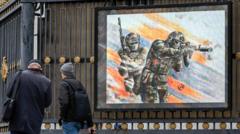As soldiers return from the front lines of the conflict in Ukraine, Russia grapples with an alarming increase in violent crime attributed to these veterans. Reports document at least 242 deaths caused by soldiers returning from the war, alongside numerous assaults that echo a disturbing pattern of aggression. An incident in Artyom serves as a chilling example, where a veteran threatened a woman, Irina, exclaiming, “I’m going to kill you!” before physically assaulting her with his crutch.
Research from independent Russian website Verstka reveals that among the ranks of returning soldiers are former convicts, many of whom were released from prison strictly for military service, with over 48,000 reportedly recruited by the notorious Wagner mercenary group. Following the death of its leader, Yevgeny Prigozhin, recruitment shifted to the Russian defense ministry, with numerous prisoners sent to the frontlines. This recruitment strategy has raised eyebrows regarding the moral implications of rewarding those with a history of heinous crimes.
The sociologist Igor Eidman highlights the dangers associated with this situation, pointing out a fundamental shift in societal perceptions of morality. Participants in the “special military operation" are celebrated in state media, leading to an unprecedented normalization of criminal behavior by soldiers, creating an environment where the line between crime and valor blurs.
Reports suggest that some veterans now believe they can act without consequence, emboldened by public recognition and altered judicial practices that offer leniency to those who have served in combat. A police officer recounted frustrations over encountering former offenders who, emboldened by their military status, dismiss legal repercussions. The Russian legal system has increasingly leaned towards issuing milder sentences for crimes committed by participating soldiers, exacerbating the feeling of impunity.
Furthermore, a new law penalizing “discrediting the Russian armed forces” has deterred victims from reporting crimes, leading to a significant increase in unreported incidents. Olga Romanova of the NGO Russia Behind Bars notes a profound disconnect between crime and punishment, indicating a rise in severe crimes—registered incidents reportedly increased by nearly 10% in 2023, with military personnel facing an uptick in legal convictions.
Sociologist Anna Kuleshova further warns of a societal shift, where violence becomes more socially acceptable due to the romanticization of militarized conflict. This troubling trend suggests that violent behavior increasingly permeates various social domains, from domestic settings to public encounters.
As Russia continues to grapple with the implications of its military actions abroad, the domestic front faces a rising tide of violence that could redefine the nation’s social fabric for years to come.

















